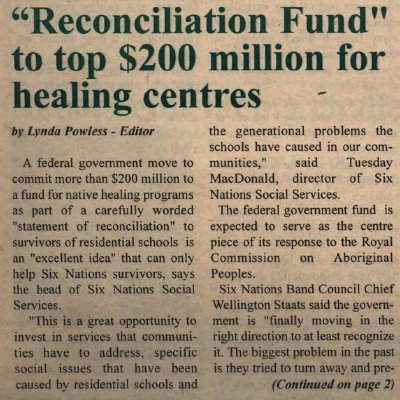"'Reconciliation Fund' to top $200 million for healing centres"
- Publication
- Turtle Island News, 17 Dec 1997
- Full Text
- "Reconciliation Fund" to top $200 million for healing centresby Lynda Powless, Editor
A federal government move to commit more than $200 million to a fund for native healing programs as part of a carefully worded "statement of reconciliation" to survivors of residential schools is an "excellent idea" that can only help Six Nations survivors, says the head of Six Nations Social Services.
"This is a great opportunity to invest in services that communities have to address, specific social issues that have been caused by residential schools and the generational problems the schools have caused in our communities," said Tuesday MacDonald, director of Six Nations Social Services.
The federal government fund is expected to serve as the centre piece of its response to the Royal Commission on Aboriginal Peoples.
Six Nations Band Council Chief Wellington Staats said the government is "finally moving in the right direction to at least recognize it. The biggest problem in the past is they tried to tum away and pre-
(Continued on page 2)
"Reconciliation Fund" to top $200 million for healing centres(Continued from front page)
tend nothing was wrong."Six Nations has seen hundreds of its children sent to the former Mohawk Residential School on the Glebe property adjacent to Brantford. The school was operated by the Anglican Church and ran up until the 1960's.
During that time hundreds of children were sent to the school where survivors talk about suffering physical, emotional and sexual abuse. Some survivors describe being strapped for speaking Mohawk at what the students came to call the "Mush Hole" because of the oatmeal children ate.
MacDonald said her grandfather was one of those.
"I can speak to my grandfather went through residential school, it had a direct impact on my mother and her children. My grandfather could speak all six languages and knew the medicines. But because of his experience at the school he refused to speak the languages or teach us medicines," she said.
"He told his kids, 'I don't want you to have to go through what I went through. If I don't teach you these things you won't have to go through what I went through.' The impact of what happened to my grandfather directly impacted my mother and now I don't know the languages or medicines."
And she said the impacts have surfaced in problems with parenting skills. "People that went through that where raised with a heavy hand. So their parenting skills weren't based on parenting skills we would have enjoyed if our society had been unaffected."
As a result, she said parenting skills for a large number of local residents were developed through the school, in an institutional clinical type of format.
"So as we grow up and have children of own, that impact is then, how they parent their own children, intentionally or not."
The fund, that is expected to be announced in the New Year, is intended to symbolize the government's break from past policies that were intended to assimilate natives, but it is likely to steer away form a direct apology in hopes of discouraging individual lawsuits for abuse suffered at residential schools.
The fund will be administered by a board of aboriginal leaders at arm's length from the federal government.
MacDonald said the fund will be the beginning of healing for many sufferers. "Its the final indication of respect from the government for those people who have been impacted, that they finally acknowledge what happened and they take responsibility for their actions."
The money is expected to be used to finance healing centres, native language training and counselling programs on reserves.
The exact amount of the fund has not been confirmed--aboriginal sources say it will surpass $300 million, while government officials put the figure at more than $200-million.
Indian Affairs Minister Jane Stewart, aid the residential school system is to blame for many of the problems currently found in native communities.
Taking children away from their families and raising them in a school setting without traditional parenting had a huge impact she said.
While many may have received a good education at the schools, others suffered physical an sexual abuse. She added, "That reality has impeded their capacity to live a full and productive life.
Describing how the school system continue for several generations, she expressed horror at the thought of the impact on parents. "I'm a mom," said the mother of two. "and the fact that there are moms and dads who went through these circumstances and then had to send their own kids. I mean, Jesus,"she said.
She said the impact of the schools has been felt across the country. The Inuit of northern Canada have told her of their experiences that were similar to those of natives in British Columbia, Manitoba and Ontario.
- Creator
- Powless, Lynda, Author
- Media Type
- Text
- Newspaper
- Item Type
- Clippings
- Publisher
- Turtle Island News
- Place of Publication
- Six Nations of the Grand River, ON
- Date of Publication
- 17 Dec 1997
- Subject(s)
- Personal Name(s)
- MacDonald, Tuesday ; Staats, Chief Wellington ; Stewart, Jane.
- Corporate Name(s)
- Government of Canada ; Six Nations Social Services ; Six Nations Elected Band Council ; Mohawk Institute ; Anglican Church of Canada.
- Local identifier
- SNPL005119v00d
- Language of Item
- English
- Geographic Coverage
-
-
Ontario, Canada
Latitude: 43.06681 Longitude: -80.11635
-
- Creative Commons licence
 [more details]
[more details]- Copyright Statement
- Public domain: Copyright has expired according to Canadian law. No restrictions on use.
- Copyright Date
- 1997
- Copyright Holder
- Turtle Island News
- Contact
- Six Nations Public LibraryEmail:info@snpl.ca
Website:
Agency street/mail address:1679 Chiefswood Rd
PO Box 149
Ohsweken, ON N0A 1M0
519-445-2954




